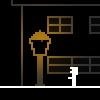IGF Nuovo Finalist, this experimental game offers moments of distilled self-reflection and sometimes even profundity.
Journey of Reflective Consciousness: through high quality presentation, it draws on player experiences of still moments of reflection
Excellent Sound Design: similar to games like Limbo, the "negative space" of distilled sounds and bigger moments allow for a more powerful experience
Occasionally "Progress" seems to come from nonsense: there are times when it's hard to know what to do next
- - -
A House in California, currently an IGF 2011 finalist for the Nuovo experimental game award, was developed by Cardboard Computer and offers an "experiential" take that emphasizes mood and self-reflection over performative action.
A point-and-click game like Machinarium et al, the purported object of A House in California is to interact with several characters/narrators as they partake in a journey of consciousness through remembrance, forgetfulness, and awareness of different real and imagined environments. I use the word "purported" specifically in that, while most games have an end scenario, as does this one, I felt strongly while playing it that the experience of play or the process of playing it, was tantamount to any specific end-goal. While the game centers around the House for each of the 4 chapters, it functions more as a weight to the gameplay which keeps things anchored and provides an object for the consciousness of the characters you play.
As experimental games go, A House In California is at once both familiar (through it's gameplay mechanics) and fresh, as it invigorates the core gameplay in new ways. First and foremost, it clearly relies upon the experiences of the player to give meaning to the events within it. Whereas in most games, one relies solely upon the fictional world to provide necessary content, here more than elsewhere, the players own memories, thoughts, and experiences help to add meaning to the game itself. Simple interactions like gazing up at the moon, while given a certain specific content here, are bolstered by the player's own memory and reflection. Similarly, as A House In California seems largely a dream-sequence, while objects are all mundane and localized (a house, books, lamp posts, stars, etc), the revolving environments shift the perspective of each, which in play with the narrator's memory and the player's, add new layers onto the everyday-mundane presentation. The effect on the player results in a sort of wonderful nostalgia which recalls the peaceful and reflective, as well as moments of inner-revelation.
The sound design has a lot to do with the game's impact as well. Though a sort of auditory "negative space", there's a minimalism similar to what you'd find in Limbo where environmental sounds like crickets are prominent. Environmental ambiance isn't all you'll experience, however, as sounds are used at critical junctures to create moments of impressive distinction. At those times, a sort of Philip Glass experience (a la Einstein on the Beach) ensues which through repetition of small noises transcends itself and pushes the game to new heights. Color has a similar function in this mostly black-and-white visual experience, and serves as "points" which allow the rest of the visuals to "circulate" around them.
A House in California is a game that ought to be played in a calm setting, with the lights off and no distractions, preferably alone. It's power is understated, and can easily be undone by mental and physical distractions. Free to play on Kongregate, every player interested in new experiences ought to set aside some time to immerse themselves in this game, which takes around 30-60 minutes to reach the ending. While I felt that some object-interactions seemed to verge on non-sensible, making trial and error a larger component than it needed to be (trial and error often in my experience removes the player from immersion), there wasn't a moment that I felt stuck or upset at the game, largely due to it's aesthetics and limited interactive possibilities. If you give this one a chance, it might presents moments that move you in simple yet profound ways.
8.6/10

